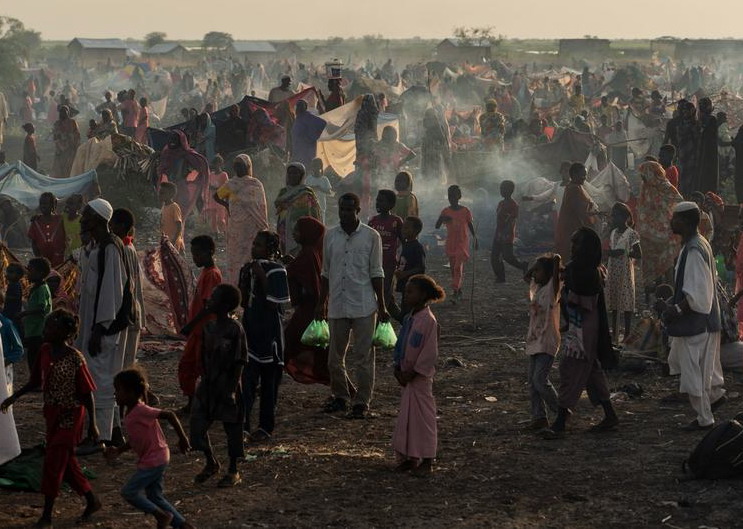Patrick Youssef, Head of Africa for the International Committee of the Red Cross (ICRC), offers a sobering analysis of Africa’s escalating humanitarian crises, amid wars in 2024, and what he said could be expected for 2025.
Speaking from Geneva, Switzerland, with Washington-DC-based geopolitical analyst Pearl Matibe as 2024 drew to a close, Youssef emphasized the indispensable role the ICRC plays in what can be described as Africa’s ‘invisible wars.’
“We’re custodians of the Geneva Conventions,” he stated, underscoring the ICRC’s mandate to uphold the laws of war and mitigate human suffering for those most vulnerable during armed conflicts. In his words, the ICRC strives to “push all actors to respect certain norms that pave the way for peace,” recognizing that sustainable solutions to protracted crises require more than immediate aid.
Youssef was unflinching in his assessment of the challenges confronting the ICRC and the communities it serves. He detailed the ripple effects of armed conflict, noting that the complexities in Africa are compounded by protracted vulnerabilities, mass displacement, and a lack of political attention. “All eyes are on the Middle East, on Ukraine now, on Syria,” Youssef remarked, lamenting how Africa’s crises often fade into the background of global discourse. Yet, the numbers, he stressed, are “mind-blowing.”
“The number of refugees only from Sudan into Egypt, Chad, South Sudan, Ethiopia, the Central African Republic, and Libya is staggering,” Youssef explained. “And this is no joke. Every day, we wake up to a new situation where we have to spend millions to respond to urgent needs.” He pointed to the ongoing crisis in South Sudan as a glaring example of how a conflict can spread across borders, escalating into regional emergencies.
Youssef also expressed concern over the fragmented responses on Africa. “We are truly heartened when we see efforts from the African Union or ECOWAS, but there are [regions] within the continent that are not being treated quickly enough.” He explained that the long-term impact of these wars is never truly addressed—not by the media, not by policymakers, and not even by interlocutors.
Citing Sudan as a grim case study, Youssef painted a stark picture; a story of a country, the third-largest in Africa by land area— that may could end up being at war for years. “This is a country covering 1.8 million square kilometres that is now engulfed in conflict. How do we address a crisis of that magnitude?” He also referenced the Sahel, where countries are attempting to form a coalition to address their security challenges but face tremendous obstacles in finding long-lasting solutions.
Youssef did not shy away from acknowledging the gaps in humanitarian response. “We distribute food parcels year after year, but when will we think about how people can produce their own food instead?” he asked, highlighting the need for more sustainable approaches to humanitarian aid.
“The methods we use today are the same ones we used 50 years ago. It’s time to think out of the box, to bring new actors to the table, and to ensure that questions relating to the Geneva Conventions and the law of war are not just left at the doors of parliaments when trying to domesticate the Geneva Conventions or a specific legal framework.” He said, “It really needs full, true political motivation from States and from actors like the African Union.”
Youssef emphasized a call to action. “Not only to say let’s stop the wars, let the guns fall silent, but meanwhile, before the guns fall silent, and while the war is waging, let’s push all actors to respect certain norms that we know would then pave the way for peace,” he said.
When asked about underreported issues, Youssef pointed to the enduring human toll of Africa’s conflicts. “We never think about the long-term impacts of these wars on people. And it may sound cliché, but when we fail to address the root causes, we’re just perpetuating the cycle of violence.” He added that climate change, displacement, and socioeconomic instability are deeply intertwined with conflict, making them impossible to address in isolation.
Despite the grim realities, Youssef conveyed a note of optimism. He highlighted a MOU recently signed by the ICRC with the African Development Bank as a beacon of hope, and a positive step toward addressing these challenges collectively, in 2025.
As 2025 approaches, Youssef remains pragmatic yet hopeful. “I’m really a hopeful person, but in the case of Africa, we’re drowning under the weight of ongoing conflicts. That said, there are signs of progress, and I believe that with sustained advocacy and collaboration, we can pave the way for meaningful change.”
Youssef’s words are a clarion call to the international community, urging all actors—military and humanitarian alike—to not only respond to crises, but to prevent them. The ICRC’s role as a custodian of the Geneva Conventions has never been more critical, particularly in Africa, where the stakes are unimaginably high.
Pearl Matibe is a Washington, DC-based geopolitical analyst and correspondent with expertise in foreign policy and international security, regularly covering the State Department, Pentagon, and White House. Follow her on X (Twitter): @PearlMatibe.




